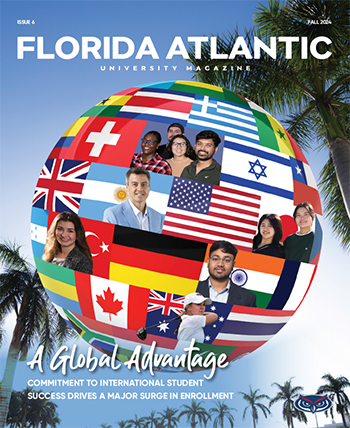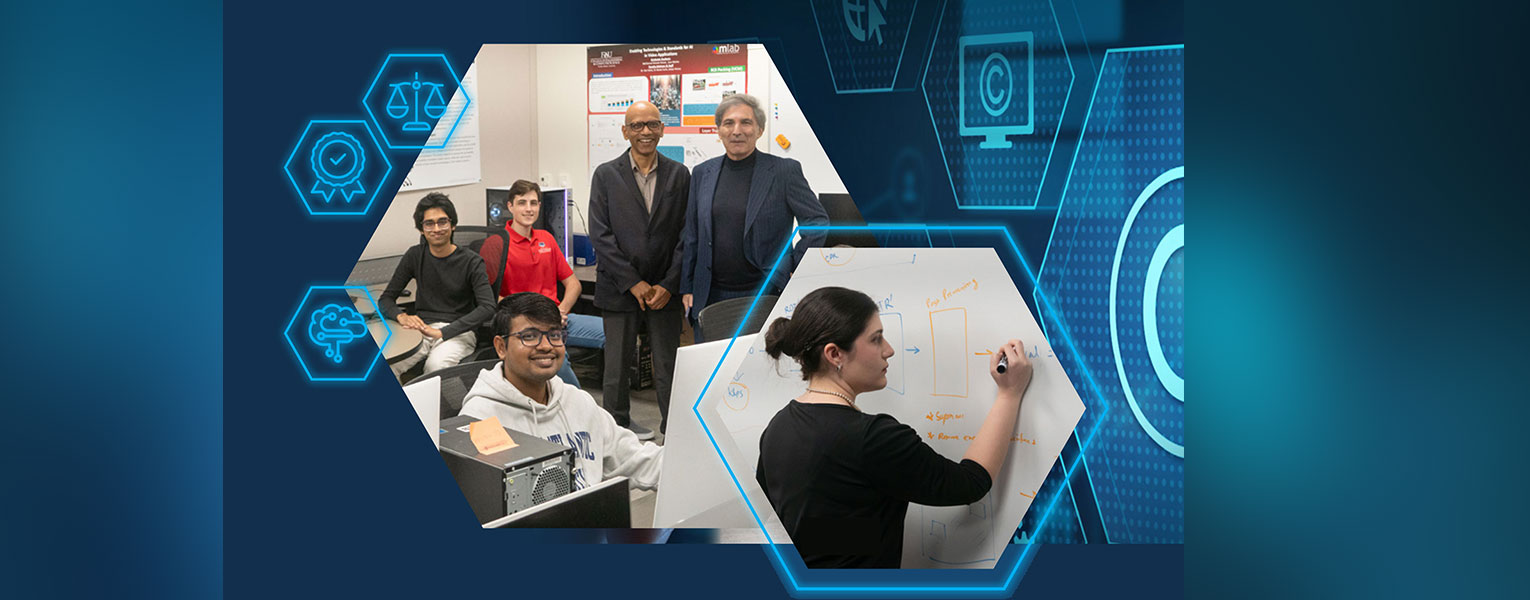6/3/2024
Florida Atlantic: Valuable Ideas
Developing a Culture of Innovation Through Intellectual Property
Headlines emerge daily about groundbreaking technologies, breakthrough medical treatments or bestselling new products. And behind all these innovations are ideas. But harnessing those ideas and fostering them through the discovery and development process requires more than creativity and scientific prowess.
At Florida Atlantic University’s College of Engineering and Computer Science, a culture is emerging that places emphasis on the importance of protecting intellectual property (IP) and formulating projects that translate beyond the academic setting to make valuable contributions to the world.
“If you just look at the world, the world is primarily being run on intellectual property,” said Hari Kalva, Ph.D., interim chair and professor in the Department of Electrical Engineering and Computer Science. “We tell students to think about it broadly. It’s not just a patent. Maybe the valuable code you write or the library you create becomes popular and everybody begins to use it. There may be ways to protect it, and you need to make sure you do that.”
IP can come in a variety of forms: patents, copyrights, trademarks and trade secrets. However, the process of securing IP protection is time-consuming and complicated. By introducing students to the basic concepts of IP as part of their undergraduate or graduate degree curriculum, they enter the workforce with an advantageous tool as they build a career.
“We tell students, you’re creating something valuable, right?” Kalva said. “If you are entrepreneurial, you can create something of your own. Or if you go work for somebody, your employer will appreciate that you care about IP because that’s what creates value in an organization these days.”
The College of Engineering and Computer Science began incorporating IP education several years ago. More recently, the college and Florida Atlantic’s Office of Technology Development formed a partnership with the National Academy of Inventors (NAI) and the Michelson Institute for Intellectual Property to incorporate an IP certificate into the curriculum at both the undergraduate and graduate levels.
The certificate was first introduced to undergraduate students in Kalva’s senior design course. In this course, students actively create projects intended to tackle real-world problems with novel ideas. The IP certificate helps students understand that their ideas and innovations don’t have to be relegated to the confines of an academic institution. They could be the groundwork for the next big invention, and they should know how to claim their ownership as soon as possible.
Kalva explained that many engineering students are naturally curious. They may write software or develop designs that could be part of a real-world solution, but they don’t naturally have the entrepreneurial understanding of how to harness it and develop it into something bigger.
“We try to emphasize quite a bit to students about identifying intellectual property and that the creative process is worth something, it’s valuable, and they need to think about it that way,” Kalva said. “Until you have an IP framework, people don’t really concern themselves about whether they are producing something of value.”
More than 700 engineering students have graduated with the IP certificate. After seeing the success of the new requirement and the interest it sparked in students, Kalva and his colleagues are developing new strategies to integrate IP concepts as an integral component of the entire degree journey.
During the Fall 2023 semester, the IP certification coursework was shifted to the Fundamentals of Engineering course, which is required for most undergraduate engineering students. Now, the groundwork is laid at the very beginning so students are prepared when their work transcends simply fulfilling an assignment and becomes something worth owning and protecting.
By the time these students reach the senior design course, they have a foundational understanding of IP. Kalva and his colleagues are currently working with the Michelson Institute and NAI to pilot an innovation commercialization module to help students develop the necessary skills to translate their ideas into business plans that offer real-world solutions.
Graduate students also must complete the NAI IP certification early in their degree programs. As Kalva points out, the entrepreneurial aspects of engineering are often overlooked in undergraduate programs, so many students begin higher-level programs without this skillset in place.
“By graduating all of our students with the value-added skill of intellectual property, I believe that adds to their portfolio and it signals that they can think a little more broadly about value creation,” Kalva said.
Juan Merlos earned his bachelor’s degree in computer science in 2022 and master’s degree in computer engineering in 2023. As a master’s student, he completed the IP certification program. Now a doctoral student focused on video coding for machines, Merlos is named as a co-inventor with Kalva on five patent applications. “Understanding how intellectual property and the patenting process work is important for my daily tasks,” Merlos said. “It is a valuable asset not only for education, but for the workplace as well, especially in research and development.”
Recognizing the value of innovation and entrepreneurship is integrated into the college’s faculty culture, as well. As Kalva explains, not all faculty members have the same familiarity or interest in the topic, but educating them helps bring awareness of how they may benefit from the IP process. Importantly, success in IP, such as securing patents or licensing agreements, is a key consideration in the tenure review process for faculty, in addition to traditional criteria such as scholarly works and publications.
By weaving a culture of innovation into both the student and the faculty experience, tangible results spill beyond the classroom setting and into research labs where IP creation can happen in earnest. Graduate students also become co-inventors, sometimes completing their degrees with their names tied to multiple patent applications.
A key partner in the College of Engineering and Computer Science’s success with IP is Florida Atlantic’s Office of Technology Development. The office manages all formal IP protection activities. Since 2020, the college has secured eight patents, the most of any single college or institute throughout the university.
“Collaboration at all levels is at the core of the college’s innovation efforts,” said Kalva. “We have this culture of innovation in the college, and we want to make sure it’s reflected in all the work we do.”
Dana Vouglitois, associate director of technology development, said it’s not unusual for engineering departments to see the most success with securing patents at a university. However, she sees Florida Atlantic’s College of Engineering and Computer Science as an example of how to meld academic achievement and innovation.
“In the College of Engineering, they value innovation and entrepreneurship, they’re incorporating it into the curriculum, and their students and faculty are experiencing success,” she said.
If you would like more information, please contact us at dorcommunications@fau.edu.

Video compression technology enables streaming-video applications such as YouTube and Netflix to transmit high-quality video simultaneously to billions of devices across the globe. Technology developed by Florida Atlantic’s College of Engineering and Computer Science and research sponsor OP Solutions, LLC promises to improve the process of streaming media.
In 2023, Florida Atlantic and OP Solutions announced that university-developed intellectual property protected by 11 United States patents was accepted as part of Versatile Video Coding (VVC), a core technology for next-generation video streaming.
Through the VVC, patent-protected technology that was developed at Florida Atlantic is part of the new global standard for the video-streaming industry. Now, the technology is being deployed across the world. For instance, Mediatek, the No. 1 television chip provider in the world, integrated VVC in their smart TV chips; Sony recently licensed VVC patents; and Brazil has mandated that VVC be part of the country’s broadcast television standard. With VVC deployments accelerating, inventions developed at Florida Atlantic will soon be incorporated into every new TV and mobile phone.
These efforts are led by Hari Kalva, Ph.D., associate chair and professor, and Borko Furht, Ph.D., professor and director of the National Science Foundation Research Center within the Department of Electrical Engineering and Computer Science.
“Through this work, we are collaborating internationally with researchers from companies, universities and different countries, and FAU is the only U.S. university that’s part of these efforts,” Kalva said.
International visibility opens new opportunities for Florida Atlantic, particularly for graduate students who are involved in VVC projects.
“This is a highly specialized technology. It has a steep learning curve,” Kalva said. “When other research teams are looking for interns, they want them to be able to hit the ground running. Companies know they can hire FAU students because they know they have experience that is highly valuable.”
